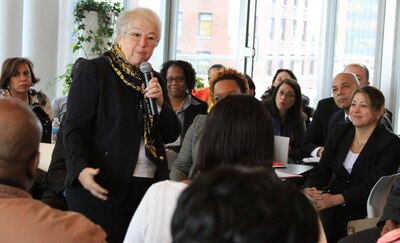Some principals already bristling at the tighter controls they’ve faced under Mayor Bill de Blasio might feel uneasy when they read that incoming chancellor Richard Carranza’s centralized some power in the last school system he ran.
But perhaps they shouldn’t panic yet. Carranza also says he trusts principal decision-making — after all, he was a principal himself.
“I’ve been a principal in two different schools in two different states, so I tremendously have faith that principals can make great decisions at the local level,” Carranza said during his first press conference in New York City on Monday.
But, he added, “there are some things you cannot just decentralize. So you need to have some central direction.”
That sentiment echoes outgoing Chancellor Carmen Fariña, who reorganized the school system to allow superintendents more authority to shape instruction and ensure principals follow the rules. Without tighter oversight, Fariña has argued, schools could have uneven instruction and practices — leading to greater inequality across the school system. That was a major shift from former Mayor Michael Bloomberg and his chancellors, who favored wresting decision-making out of the hands of central office staff and giving principals more power.
And indeed, in interviews with more than a dozen principals this summer, school leaders complained to Chalkbeat about intense scrutiny of their daily tasks bordering on micromanagement. Many said the more centralized management style came with endless emails, compliance items, and paperwork, that robbed them of precious time they could be in classrooms or working on more innovative education practices.
Some principals are hoping for relief from the new chancellor.
“The job under the current chancellor has definitely become stifling in certain ways,” said a principal from the Bronx who asked to remain anonymous to avoid criticizing his boss. “It’s just like big-ticket [education department] branded initiative after initiative that feels very disjointed and doesn’t feel connected to the work that’s happening here at schools.”
Other principals don’t see a disconnect between centralization and their goals. “As long as it’s in line with collaboration between schools with central supports, I think that’s a great way to grow our system,” said Anthony Cosentino, principal at PS 21 in Staten Island.
New York City Councilman Ritchie Torres said that how Carranza handles the school system’s management will be a defining part of his tenure.
“If he could reverse the centralizing legacy of Carmen Fariña I’d be a happier man,” Torres said. “The question mark for me is how he’s going to grapple with the centralizing legacy of his predecessor.”
Carranza’s past record on principal authority is mixed. Most recently, in Houston, he supported taking some budgeting power back from principals and said during Monday’s press conference that decentralization in Houston had “run amok.”
Instead of giving principals a pot of money and providing them with the full authority to spend, Carranza supported attaching restrictions to the funding in order to ensure each school had an adequate number of administrators, teachers, and other school staff, such as nurses. But this budgeting arrangement may have been specific to Houston — in an interview with a Houston television station, Carranza said he supported this change only because Houston was facing a dire budget situation.
“We’re not going to take innovation away from principals,” Carranza said in the interview. “But what we’re going to say to principals, instead of you getting a pot of money and then having to kind of knit together what your staffing is, it’s going to be really transparent.”

Josephine Rice, the executive director of the Houston Association of School Administrators, said principals were vocal about their concerns when Carranza first proposed the budget changes. But he listened to their worries, and towards the end, principals felt they would receive more flexibility and that the plan was generally headed in the right direction, she said.
The model still has not been finalized and that leaves a lot of uncertainty among Houston principals at the moment, Rice said.
“While principals feel better about the staffing model,” she said, “they’re still not feeling good because there are so many questions that are out there.”
Houston Board trustee Sergio Lira said he would not expect Carranza to implement the same policy in New York unless it was necessary — and that Carranza’s style is to listen to educator concerns before acting. “Tell the principals [in New York] they’re lucky,” Lira said. “They’ve got a good guy.”
In San Francisco, where Carranza served as superintendent for four years, he attracted money from the Salesforce Foundation to start a Principal’s Innovation Fund, which awarded grants to principals and allowed them to allocate money as they saw fit. Marc Benioff, the chief executive of Salesforce, praised Carranza’s decision to delegate authority to the principals in a recent New York Times story.
Carranza also stood by principals by respecting their choice to hire teachers from Teach for America, despite the school board’s opposition.
The new chancellor should resist the urge to stick to a centralized system, said David Baiz, a former East Harlem Middle School principal who left the position last year to to get his doctorate in education leadership at Harvard. Baiz believes that the current administration forced principals to follow central directives instead of doing what was best for their schools — and it’s something he hopes the new chancellor changes.
“I would suggest for him to find a way to bring innovation back to New York City,” Baiz said.
Alex Zimmerman contributed reporting.
